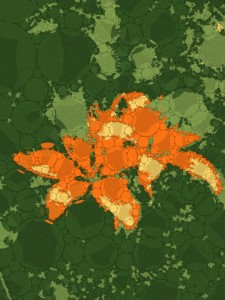
Many things have memories attached, and discarding the object sometimes feels like discarding the memory. The paperweight I bought in Prague while traveling to train Eastern Europeans about network security software. A tin butterfly from our time in Mexico when I was a child. The sequinned baby shoes I use as a prop in the flash class. I feel as though if I put them aside I may lose the thing that triggers the memory.
While I’m not ditching everything, a lot of these are getting digitized. I take a few pictures with my camera and stick it aside. Here’s an example of a book I’ve been carrying around since high days. My paternal grandmother got it for me when I expressed an interest in folk tales and folk songs. I drew on it heavily when writing songs for Armageddon, sometimes adapting songs outright, otherwise creating ones patterned after the originals.
It’s a hefty doorstop of a book. I suspect I’ll be able to find this knowledge, or comparable stuff, on the net whenever I need to. But at the same time, the object holds memories: sitting in my room in high school, reading through it, while the rain drummed on the roof and the locust tree outside my window tapped its long fingers on the glass, for one. Performing songs based on it as my bard on Armageddon, purple-haired, seemingly bemused but secretly sharp, Karaluvian Fale. I take more than just a photo of the dustjacket: one of the inside so I can see the font, another of an illustration, one of an enigmatic and very scrawly note. Enough that I’ll be able to evoke it, access those memories again if I want to.
What’s the best way to preserve these images? I haven’t gotten that far yet. For now I’m saving and tagging, and trying to shrink down the mass of physical stuff attached to my life.
Love the Easter Bunny and want to find out what happens next? Support Cat on Patreon in order to have a say in what she writes next, as well as getting other snippets, insights into process, recipes, photos of Taco Cat, chances to ask Cat (or Taco) questions, discounts on and news of new classes, and more? Support her on Patreon.








2 Responses
That clown teapot is the most distressing thing I’ve ever seen 🙂
I totally know what you mean about the memory triggers. I no longer put photos in photo albums because I need them out, in front of me, where I can see them, in order to remember. So I collage everything and hang them on the walls. Photo collages of trips, family members, etc. are what I hang on my walls instead of art work. It’s like an external memory drive for my life, I guess 🙂
Oh, I understand, at least a bit. We’re decluttering here – it’s a relatively low-key slow process, but I think we’ve thrown out or donated 25 bags of STUFF and ten feet of shelf space. And I don’t know what we’ll do about paring down stuff that matters.